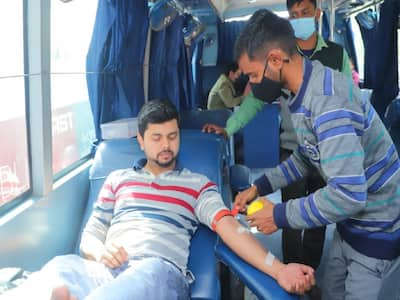
With sustained efforts, we can ensure a reliable blood supply chain, save countless lives, and contribute to achieving multiple health and development targets.
World Blood Donor Day 2023: Blood donation plays a vital role in ensuring the availability of safe blood for transfusion. While blood transfusion is a life-saving intervention, many countries struggle with the shortage of donated blood. Promoting voluntary blood donation is essential to meet the increasing demand for blood and address various health and development goals. In this article, Dr Sangeetha Gayam, Head of the Department of Transfusion Medicine, Citizens Specialty Hospital, Hyderabad, will explore the importance of increasing voluntary blood donation and how it contributes to healthcare and development.
Addressing Blood Shortages
One of the primary reasons to focus on increasing voluntary blood donation is to address the persistent issue of blood shortages. Due to limited contributions, many healthcare facilities must help maintain an adequate blood supply. By encouraging more individuals to donate blood voluntarily, the supply can be increased, ensuring that patients in need receive timely and safe transfusions. Regular and voluntary blood donations are necessary to build a sustainable supply chain that caters to emergencies, surgeries, and chronic medical conditions.
Reducing Transfusion: Transmissible Infections
Voluntary blood donation plays a significant role in reducing the risk of transfusion-transmissible infections (TTIs). When individuals donate blood voluntarily, they undergo rigorous screening to detect diseases such as HIV, hepatitis B and C, syphilis, and malaria. This careful screening helps identify potential donors carrying these infections, preventing their blood from entering the supply chain. By increasing voluntary blood donation, the number of infected blood units can be minimized, ensuring the safety of recipients and reducing the spread of infectious diseases.
Supporting Maternal And Child Health
Maternal and child health is a critical area where voluntary blood donation is crucial. Pregnancy-related complications, such as postpartum haemorrhage, can lead to life-threatening situations for mothers and infants. Access to safe blood transfusions is vital in managing such emergencies. By increasing voluntary blood donation, the availability of safe blood can be improved, reducing maternal and infant mortality rates. Additionally, blood transfusions are often required for children with severe anaemia or those undergoing complex surgeries. A robust voluntary blood donation system ensures these vulnerable populations access the necessary blood products.
READ RELATED: Coca-Cola Is Launching a New Mystery Flavor Next Week
Fostering Community Engagement And Solidarity
Voluntary blood donation fosters community engagement and solidarity. It creates a sense of collective responsibility towards the well-being of fellow community members. Blood drives and donation campaigns not only raise awareness about the importance of donating blood but also encourage individuals to contribute to the betterment of society. Voluntary blood donation events allow people from different backgrounds to come together for a common cause. This unity strengthens social cohesion and promotes a culture of giving beyond blood donation.
Contributing To Sustainable Development Goals
Increasing voluntary blood donation aligns with several Sustainable Development Goals (SDGs) set by the United Nations. Voluntary blood donation directly contributes to this goal by providing safe blood for transfusions, reducing mortality rates, and improving overall health outcomes. Moreover, voluntary blood donation is linked to SDG 1 (No Poverty) and SDG 10 (Reduced Inequalities), as it helps in addressing health disparities and ensuring equal access to life-saving interventions.
Conclusion
Promoting voluntary blood donation is essential to meet the growing demand for safe blood and address various health and development goals. By increasing the number of voluntary blood donors, we can overcome blood shortages, reduce transfusion-transmissible infections, support maternal and child health, and foster community engagement. Governments, healthcare organizations, and civil society must work together to create awareness, establish convenient donation facilities, and incentivize voluntary blood donation. With sustained efforts, we can ensure a reliable blood supply chain, save countless lives, and contribute to achieving multiple health and development targets.
Total Wellness is now just a click away.
Follow us on
window.addEventListener(‘load’, (event) => {
// $(document).ready(function(){
$(‘#commentbtn’).on(“click”,function(){
(function(d, s, id) { var js, fjs = d.getElementsByTagName(s)[0]; if (d.getElementById(id)) return; js = d.createElement(s); js.id = id; js.src = “//connect.facebook.net/en_US/sdk.js#xfbml=1&version=v2.3”; fjs.parentNode.insertBefore(js, fjs);}(document, ‘script’, ‘facebook-jssdk’));
$(“.cmntbox”).toggle();
});
// });
});








